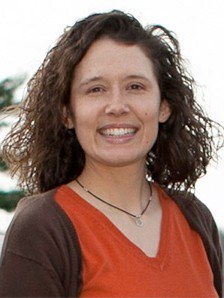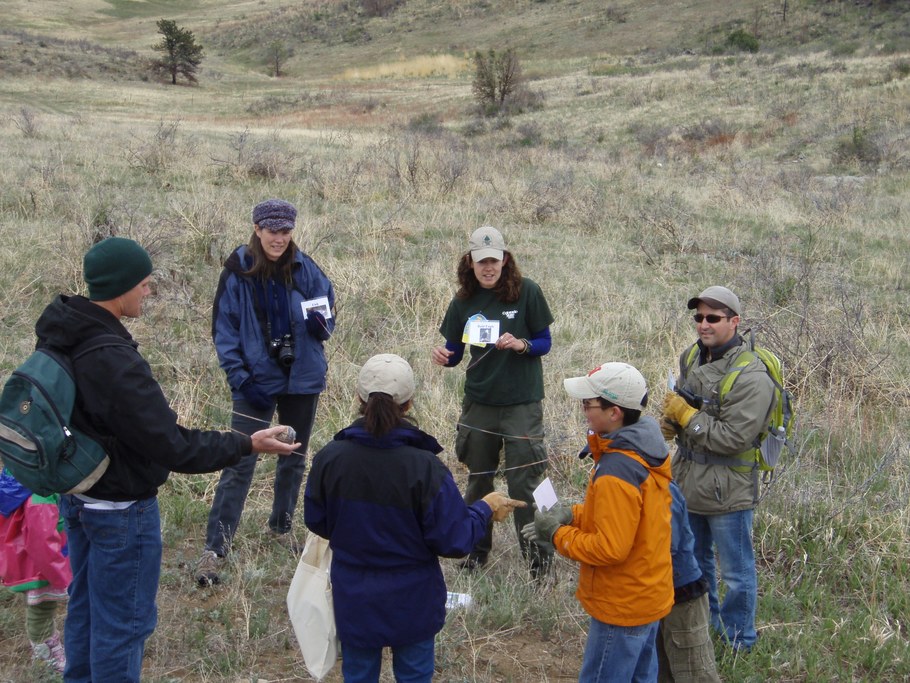Jamie Dahl's job is to make sure natural resources students have exposure to hands-on experience.

Jamie Dahl
Degrees Earned
M.S., Forest Resources, 2006
B.S., Forest Science, 2004 (now Forest Ecosystem Management)
A Forestry-Loving Family in Ft. Collins, Colorado
Jamie Dahl helps students get the real experience and skills they need to succeed in forestry by teaching courses and coordinating volunteer programs as part of the Colorado State Forest Service at Colorado State University. She was exposed to educational outreach as a potential career option early, and caught "the bug of working with young people" in her third year as an undergrad. From her experiences in undergraduate research, working as a counselor, graduate school, and her in current position, she has become convinced that exposure to field opportunities, internships, and opportunities other than the simple book and classroom approach are crucial to helping students find their preferred career paths.
Jamie and her husband Chris, who is also a Penn State Forestry alum and works for the US Forest Service, are raising their son to appreciate the importance of forests and the outdoors. She gives special credit to the Society of American Foresters (SAF) for creating a culture that kept them both involved, at Penn State and beyond. "I got a lot of my hands on experience through SAF and that's what helped me keep going in the major and made me feel at home," she explains.
Q: Is there a life lesson you can give us from your time at Penn State?
A: I was one of those people who wanted to work in forestry, but I didn't really know what it meant. I didn't realize it would include active management and actually harvesting trees. A lot of people are misinformed. They think that if you're cutting a tree down, it's always a bad thing. Penn State Forestry showed me the other side of the story, that cutting down trees can actually be a good thing for the environment.

Q: What advice do you give someone looking to get a job with a degree in forestry?
A: Think outside the box. Urban and community forestry is a big opportunity that seems sort of hidden. A lot of students don't think they'll like working in an urban or suburban area, but I just describe it as "trees where people are," and there's a big need for that. It's also a great opportunity to connect people who don't know a lot about trees or natural resources to what we do. Everyone can see the trees in their backyards and communities. I also encourage students not to be afraid to go for the field courses, seasonal jobs, and the get-dirty positions, because that's where you can explore what you enjoy and gain contacts and credibility with the folks you're going to work with.

Q: What made you decide to pursue a Master's degree at Penn State?
 A: I had offers with stipends from 3 other places, but I chose Penn State because I liked the project and professor and was actually able to keep working on something I had started as an undergrad. It's an amazing thing to be able to continue your schooling and get a stipend for your research. And that was an important tool to have--I wouldn't have gotten most of the jobs I've had without a Master's degree. In fact, my first job was at Penn State, teaching and advising for 4 years after grad school.
A: I had offers with stipends from 3 other places, but I chose Penn State because I liked the project and professor and was actually able to keep working on something I had started as an undergrad. It's an amazing thing to be able to continue your schooling and get a stipend for your research. And that was an important tool to have--I wouldn't have gotten most of the jobs I've had without a Master's degree. In fact, my first job was at Penn State, teaching and advising for 4 years after grad school.
Q: Where do you see yourself going from here?
A: I have just been accepted into a doctoral program here at CSU in Higher Education Leadership, while continuing in my current position. I plan to do a research project on the importance of experiential learning and how it relates to student satisfaction and success in finding employment after students leave the university. I'd love to continue to work as an advocate for students at a higher level within the university environment.
Q: What did you do as a forestry student?
- Society of American Foresters
- Xi Sigma Pi
- Study Abroad (Germany)
- Conservation Leadership School (Counselor)
- Project Learning Tree
- Summer Internships (Gettysburg National Park, Appleton Inc.)
- Undergraduate Research

